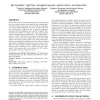112
click to vote
SYNTHESE
2010
15 years 12 days ago
2010
In this paper, I investigate the relationship between preference and judgment aggregation, using the notion of ranking judgment introduced in List and Pettit (Synthese 140(1–2):2...
135
click to vote
UMUAI
2008
15 years 1 months ago
2008
We explored the reliability of detecting a learner's affect from conversational features extracted from interactions with AutoTutor, an intelligent tutoring system that helps...
SIGIR
2008
ACM
15 years 1 months ago
2008
ACM
Information retrieval evaluation has typically been performed over several dozen queries, each judged to near-completeness. There has been a great deal of recent work on evaluatio...
108
click to vote
JIIS
2008
15 years 2 months ago
2008
We propose a natural framework, called NF, which supports development of formal proofs on a computer. NF is based on a theory of Judgments and Derivations. NF is designed by observ...
CORR
2010
Springer
15 years 2 months ago
2010
Springer
We present an approach to type theory in which the typing judgments do not have explicit contexts. Instead of judgments of the shape A : B, our systems just have judgments of the ...
113
click to vote
APGV
2006
ACM
15 years 5 months ago
2006
ACM
Distances in immersive virtual environments (VEs) have been commonly reported as being spatially compressed while the same judgments are performed accurately in real space. Previo...
101
click to vote
CIKM
2007
Springer
15 years 6 months ago
2007
Springer
Information retrieval experimentation generally proceeds in a cycle of development, evaluation, and hypothesis testing. Ideally, the evaluation and testing phases should be short ...
134
click to vote
ECSQARU
2001
Springer
15 years 6 months ago
2001
Springer
The aim of this paper is to test if conjunctive and disjunctive judgments are differently accounted for possibility and probability theories depending on whether (1) judgments are ...
108
click to vote
ICAIL
2009
ACM
15 years 8 months ago
2009
ACM
Throughout its history, AI researchers have alternatively seen their mission as producing computer behavior that is indistinguishable from that of humans or as providing computati...

